Vietnamese traditional festivals, a priceless treasure of intangible culture, are the connecting thread between the past, present, and future of 54 brotherly ethnic groups. More than just religious activities, festivals are living museums preserving customs, practices, and the unique identities of each region. This is an opportunity for communities to express gratitude to gods, national heroes, and those who contributed to building and defending the country. Join “Du lịch khắp thế gian” to explore the most unique traditional festivals in Vietnam, where culture and history intertwine, offering unforgettable experiences.
1. Hung Kings Temple Festival – Hung Kings Commemoration Day
Hung Kings Temple Festival, also known as Hung Kings Commemoration Day, is one of the most sacred and important festivals in Vietnam. Held annually on the 10th day of the 3rd lunar month at the Hung Kings Temple historical site in Viet Tri city, Phu Tho province, the festival commemorates the great merits of the Hung Kings, the first kings who founded the Vietnamese nation. The Hung Kings worship belief is not only a source of national pride but is also recognized by UNESCO as a Representative Intangible Cultural Heritage of Humanity.
During the festival days, a solemn and respectful atmosphere pervades Hung Kings Temple. Before the main festival day, many unique folk cultural activities are organized, such as Xoan singing, lion dances, and traditional folk games, attracting a large number of tourists and local people to participate. On the main festival day, the 10th day of the 3rd lunar month, a solemn palanquin procession and incense offering ceremony at the Upper Temple take place, expressing the deep gratitude of the Vietnamese people to their ancestors. Hung Kings Temple Festival is not only an occasion for Vietnamese people to look back to their roots but also an opportunity to promote Vietnamese culture and history to international friends.
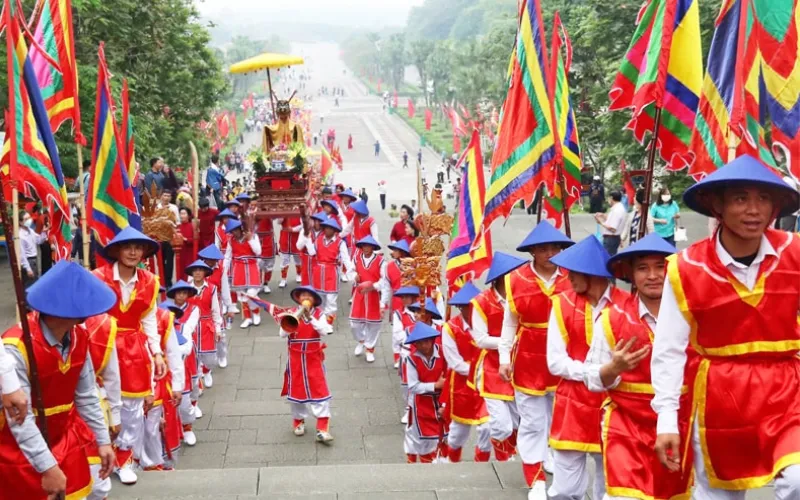
2. Lim Festival – Quintessence of Quan Ho Bac Ninh Culture
Lim Festival, the largest and most unique festival of Bac Ninh province, is a cultural rendezvous not to be missed every spring. Taking place from the 12th to the 14th day of the first lunar month, Lim Festival attracts visitors with a cultural space imbued with Kinh Bac identity, featuring sweet and soulful Quan Ho folk songs and traditional folk games. Lim Festival not only signifies spring joy and wishes for good luck but also serves as an occasion to remind later generations of good cultural traditions, martial spirit, and patriotism.
During the festival days, visitors will immerse themselves in the unique Quan Ho culture, enjoying charming call-and-response singing on dragon boats, under banyan trees, or at camps. “Lien anh” and “Lien chi” (male and female Quan Ho singers) in traditional costumes, sing melodious and tender Quan Ho tunes, captivating hearts. In addition, Lim Festival also has many exciting entertainment activities such as wrestling, swing, blindfolded goat catching, creating a bustling and lively festival atmosphere. Lim Festival is not only a festival of Bac Ninh alone but also a cultural pride of the entire Vietnamese nation.
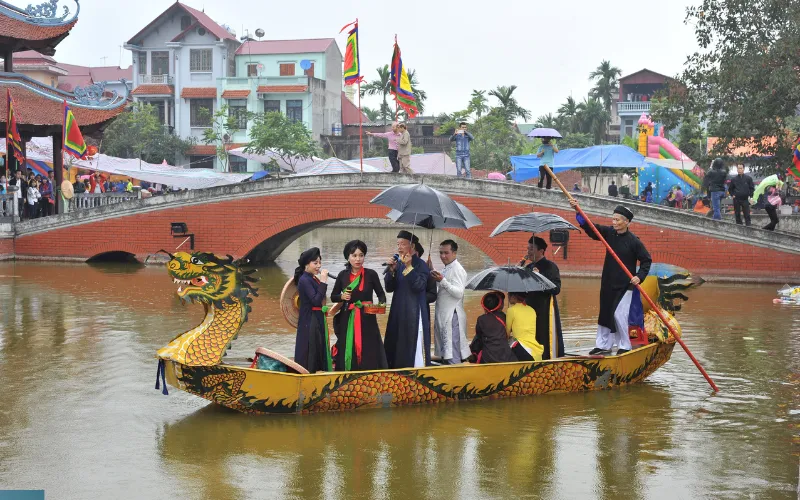
3. Tran Temple Festival Nam Dinh – Remembering the merits of the Tran Dynasty
Tran Temple Festival Nam Dinh, held from the 15th to the 20th day of the 8th lunar month annually at the Tran Temple historical site, Loc Vuong ward, Nam Dinh city, is an occasion to pay tribute to the merits of the 14 Tran kings, who made great contributions to building and protecting the country. Tran Temple Festival not only carries deep historical and cultural values but is also a spiritual destination attracting a large number of pilgrims from all over.
Coming to Tran Temple Festival, visitors not only admire the unique architecture of the historical site but also immerse themselves in the solemn atmosphere of traditional rituals such as palanquin processions, worship ceremonies, and especially the seal opening ceremony. The Tran Temple seal opening ceremony takes place on the night of the 14th day of the first lunar month, signifying prayers for national peace, people’s well-being, and happiness for everyone. In addition, during the festival days, there are also many unique cultural and artistic activities such as lion dances, Cheo singing, and folk games, creating a joyful and exciting atmosphere. Tran Temple Festival is not only a place to commemorate the Tran kings but also a place to educate younger generations about patriotism and martial spirit.
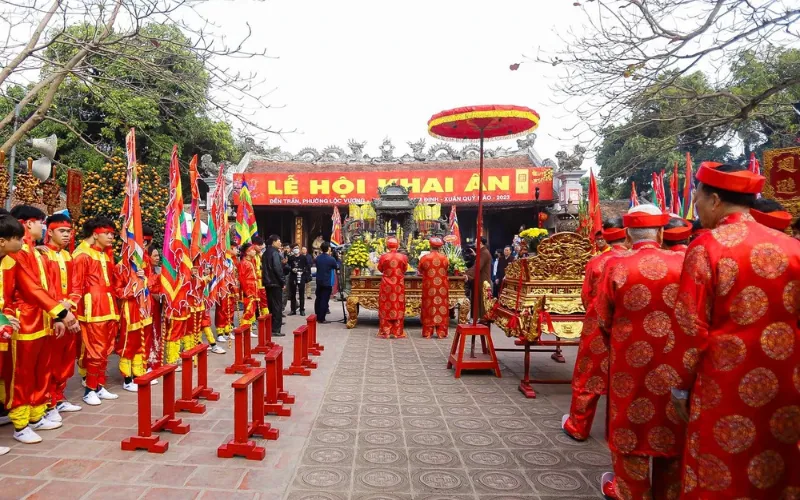
4. Giong Festival – Reenacting the legend of Saint Giong
Giong Festival, one of the largest and most unique festivals of the Red River Delta region, is an important cultural event commemorating Saint Giong, the “immortal” saint in Vietnamese folk beliefs. Giong Festival is not only a unique and distinctive festival but also a Representative Intangible Cultural Heritage of Humanity recognized by UNESCO. The festival vividly and attractively reenacts the legend of Saint Giong, the hero who contributed to driving away the An invaders and protecting the country.
The main Giong Festival is held on the 8th and 9th days of the 4th lunar month annually at Phu Dong Temple (Gia Lam, Hanoi) – the birthplace of Saint Giong, and Soc Temple (Soc Son, Hanoi) – the place where Saint Giong ascended to heaven. The festival includes many solemn rituals and unique folk cultural activities such as palanquin processions, worship ceremonies, battle reenactments, dances, and songs, attracting thousands of participants. Giong Festival is not only an occasion to commemorate the merits of Saint Giong but also an opportunity to preserve and promote the good traditional cultural values of the nation, expressing the aspiration for peace and the martial spirit of the Vietnamese people.
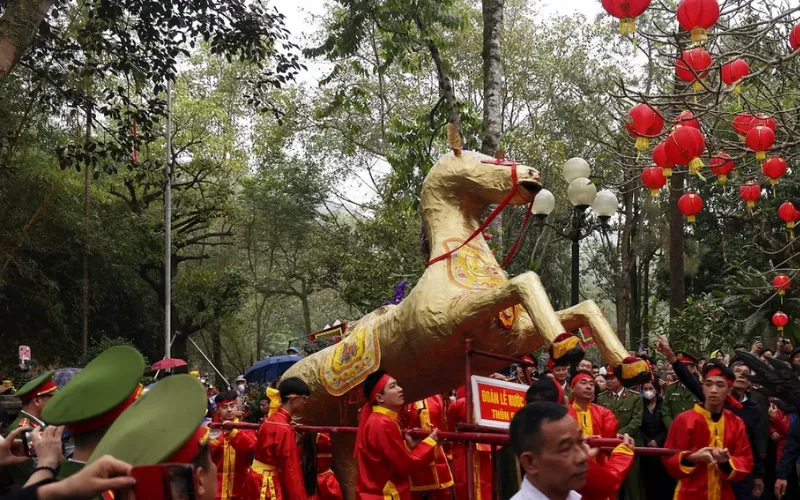
5. Long Tong Festival of the Tay People – Praying for bountiful harvests
Long Tong Festival, also known as the Field-Praying Festival, is one of the most important and unique festivals of the Tay ethnic group. The festival not only carries the distinct cultural identity of the Tay people but also represents the cultural exchange with other brotherly ethnic groups such as Nung, Dao, and San Chi… Long Tong Festival is a religious activity praying for favorable weather, bountiful harvests, and a prosperous and happy life.
The time to hold the Long Tong Festival is not fixed but depends on each locality and usually takes place after the Lunar New Year, when spring comes. In Chiem Hoa (Tuyen Quang), the festival is usually held on the 8th day of the first lunar month. The festival includes many traditional rituals such as worshiping gods, Then singing, lion dances, and folk games such as “tung con” (throwing cloth balls), tug-of-war, and “danh yen” (shuttlecock kicking). Long Tong Festival is not only an occasion for people to pray for a peaceful new year and bountiful harvests but also an opportunity for cultural exchange and strengthening community solidarity.
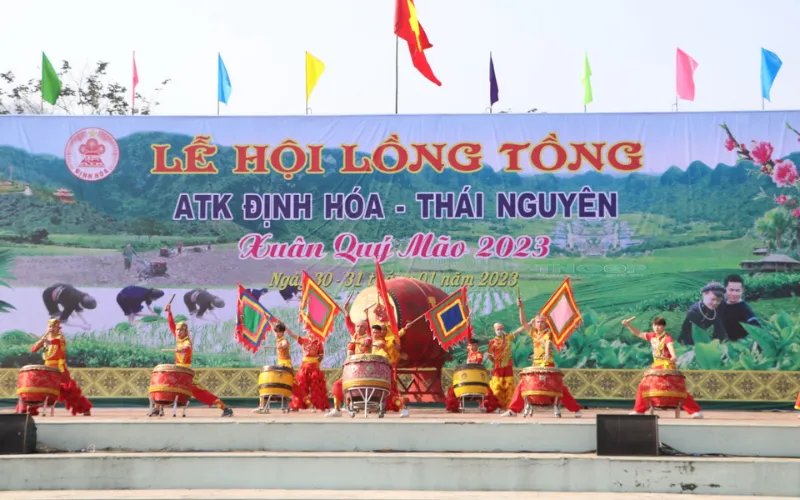
6. Ba Ponagar Tower Festival Nha Trang – Honoring the Mother of the Land
Ba Ponagar Tower Festival Nha Trang, held from the 20th to the 23rd day of the 3rd lunar month annually at the Ponagar Tower relic, Nha Trang city, Khanh Hoa province, is an important festival of the people of Central Vietnam, especially the Cham people. The festival is an occasion to commemorate and honor Ba Ponagar, the goddess considered the Mother of the Land, the protector of crops and the lives of the people.
Ba Ponagar Tower Festival not only carries religious significance but is also a symbol of community solidarity and cultural exchange between ethnic groups. During the festival days, many traditional rituals are reenacted, such as palanquin processions, the Goddess bathing ceremony, and the national peace prayer ceremony, along with unique cultural and artistic activities such as shadow dances and classical drama. Ba Ponagar Tower Festival attracts tourists not only by its sacred cultural space but also by its unique traditional cultural values, contributing to enriching the Vietnamese cultural tapestry.
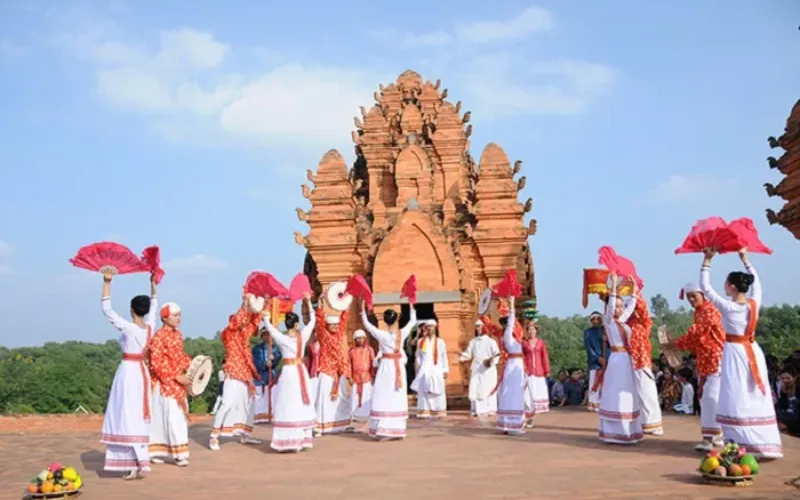
7. Nghinh Ong Festival Can Gio – Praying for peace for fishermen
Nghinh Ong Festival Can Gio, held on the full moon day of the 8th lunar month annually in Can Gio district, Ho Chi Minh City, is a traditional festival imbued with the maritime culture of Southern fishermen. The festival is an occasion to honor “Lord Whale,” also known as the Southern Sea General, the patron saint of fishermen, praying for favorable weather, calm seas, and boats full of fish and shrimp.
Nghinh Ong Festival Can Gio is not only a religious activity of fishermen but also a cultural event attracting a large number of domestic and international tourists. During the festival days, many traditional rituals are organized, such as the Lord Whale welcoming ceremony and the Lord Whale worshiping ceremony, along with unique folk cultural activities such as classical drama, lion dances, and boat racing. Nghinh Ong Festival Can Gio is not only an occasion to pray for peace and luck but also an opportunity to explore the unique maritime culture of Can Gio, immersing oneself in the bustling and lively festival atmosphere.
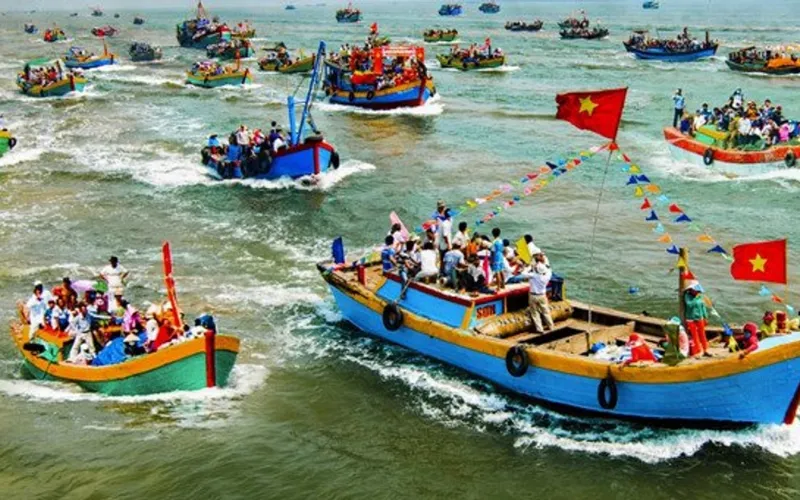
8. Ba Chua Xu Temple Festival Sam Mountain – Spiritual destination in An Giang
Ba Chua Xu Temple Festival Sam Mountain, held from the night of the 23rd to the end of the 27th day of the 4th lunar month annually at Ba Chua Xu Temple, Chau Doc, An Giang, is one of the largest and most sacred festivals in the South. Ba Chua Xu Temple Sam Mountain is a famous spiritual destination, attracting millions of pilgrims each year. The festival is an occasion for people to express their sincerity, praying for peace, fortune, and health for their families and loved ones.
Ba Chua Xu Temple Festival Sam Mountain is not only famous for its sacredness but also for its unique traditional rituals and bustling festival atmosphere. Before the main festival day, on the 10th day of the 3rd lunar month, the temple management board will elect the head of the ceremony, who must be an elderly, healthy, moral person with a happy family. During the festival days, rituals such as the Goddess bathing ceremony, the spirit tablet procession, the main worship ceremony, and the spirit tablet return procession are solemnly performed, attracting a large number of people and tourists to participate. Ba Chua Xu Temple Festival Sam Mountain is not only a religious event but also an opportunity to explore the culture and unique architecture of Ba Chua Xu Temple and experience the unique festival atmosphere of An Giang.
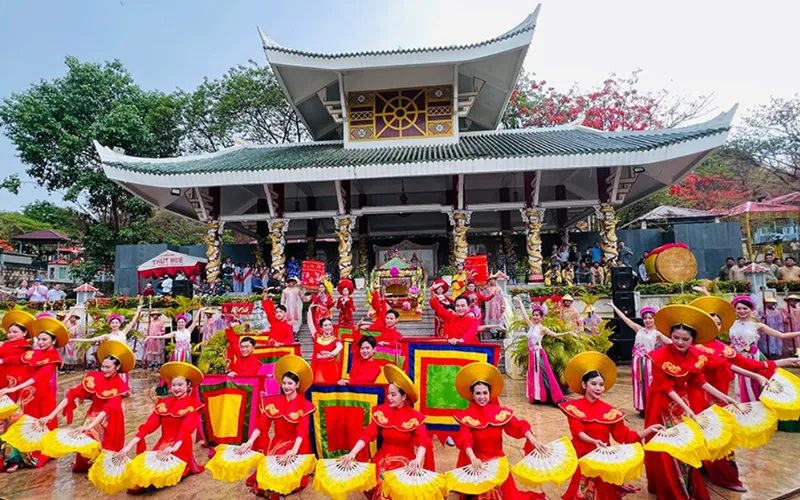
9. Hoa Lu Festival Ninh Binh – Returning to the ancient historical capital
Hoa Lu Festival Ninh Binh, also known as Truong Yen Festival or Co Lau Festival, is held in early March of the lunar calendar annually at Hoa Lu Ancient Capital, Ninh Binh. The festival is an occasion to commemorate two emperors who made great contributions in national history, Dinh Tien Hoang and Le Dai Hanh. Hoa Lu Festival not only carries deep historical value but is also a cultural event attracting a large number of tourists to Ninh Binh.
Hoa Lu Festival was first organized during the Ly Dynasty, when King Ly Cong Uan moved the capital to Thang Long. The festival includes many traditional rituals imbued with national cultural identity such as water procession, worship ceremonies, along with cultural, artistic, and folk game activities. Coming to Hoa Lu Festival, visitors not only immerse themselves in the historical and cultural space of the ancient capital but also participate in traditional festival activities, learning about the precious cultural and historical values of the nation.

10. Perfume Pagoda Festival – Pilgrimage to the Buddhist land
Perfume Pagoda Festival, one of the longest festivals in the North, takes place from January to March of the lunar calendar annually at Perfume Pagoda, Huong Son commune, My Duc district, Hanoi. Perfume Pagoda is not only a famous spiritual tourist destination but also an attractive cultural destination, attracting a large number of tourists, especially at the beginning of the new year. Perfume Pagoda Festival is an opportunity for tourists to make a pilgrimage to the Buddhist land, praying for peace, luck, and experiencing the unique festival cultural space.
The official opening day of the festival is the 6th day of the first lunar month, but the time when Perfume Pagoda Festival attracts the most visitors is from the full moon of the first lunar month to the 18th day of the second lunar month. During the festival days, a sacred atmosphere pervades Perfume Pagoda, from pagodas, temples, shrines to roads and streams. Visitors to Perfume Pagoda Festival not only offer incense and pray but also immerse themselves in the majestic nature, participating in folk cultural activities such as mountain climbing, boating, and listening to Cheo singing and spiritual singing. Perfume Pagoda Festival is not only a religious festival but also a unique cultural and tourist festival, offering unforgettable spiritual and cultural experiences.
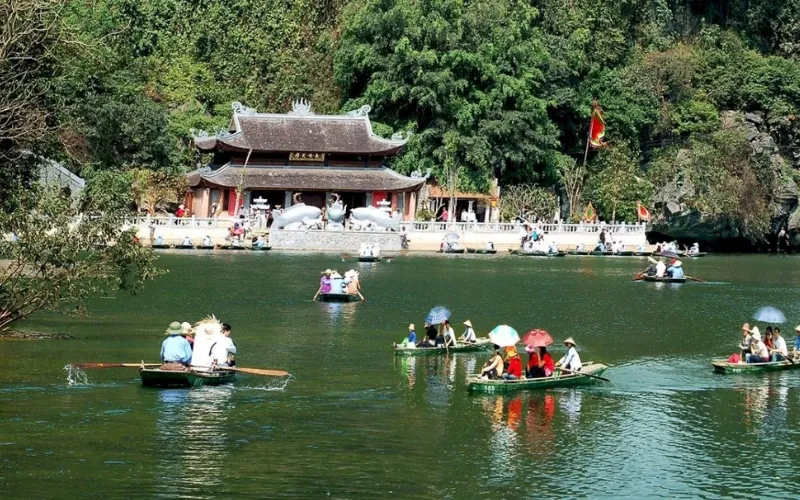
Conclusion
Vietnam, a country with a thousand years of civilization, is proud of its rich and unique treasure of traditional festivals. Each festival is a colorful cultural picture, reflecting the spiritual life, beliefs, and unique identities of each region. From the sacred Hung Kings Temple Festival, the sweet Quan Ho Lim Festival, to the heroic Giong Festival, and the mysterious Ba Ponagar Tower Festival, each festival carries deep cultural and historical values, contributing to creating a rich and distinctive Vietnamese cultural identity. Come and experience these unique traditional festivals to deeply feel the beauty of Vietnamese culture and discover meaningful spiritual journeys.